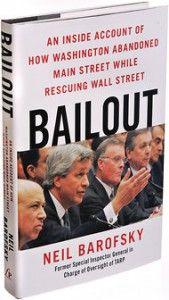Mortgage lawsuit against Gov. Brown reopens old wounds
by James Poulos | March 22, 2014 1:55 am
 [1]It’s a hallmark of modern-day government: Allocate money for one purpose, spend it for another. Congress isn’t the only culprit. While the federal government has long stood accused of “raiding the Social Security trust fund,” courts across America have given the stamp of legitimacy to state governments’ reallocation of funds.
[1]It’s a hallmark of modern-day government: Allocate money for one purpose, spend it for another. Congress isn’t the only culprit. While the federal government has long stood accused of “raiding the Social Security trust fund,” courts across America have given the stamp of legitimacy to state governments’ reallocation of funds.
So Gov. Jerry Brown had little reason to hesitate when the opportunity arose in 2012 to pay down some of California’s debt with a sudden windfall. Thanks in substantial part to Attorney General Kamala Harris, state governments managed to negotiate $25 billion [2]from the big banks blamed for triggering the 2007 housing crisis with bad lending practices.
Lawmakers were already in the habit of tapping various funds to squeak through the state’s budget shortfalls. So, together with Brown, they simply peeled off $410 million from California’s share of the mortgage settlement.
Now, a new lawsuit claims it was against the law to spend $369 million of the money that way. As The New York Times reports[3], the suit argues that such transfers only pass legal muster if they don’t “interfere with the object for which the special fund was created and the transferred amount is repaid when feasible.” Given that California now faces an over $4 billion budgetary surplus, the plaintiffs believe it’s high time Brown paid back the lump sum.
Relief money
It’s hardly a slam-dunk case. Just months after the landmark settlement, state attorneys general across the country found that lawmakers were eager to spend their newfound winnings on much different line items. One housing nonprofit, Enterprise Community Partners, revealed[4] that, in 2012, states had already reallocated over half the mortgage relief money on other expenditures. Litigation that has since arisen from the surprising figures hasn’t fared well. Arizona’s Supreme Court okayed[5] a $50 million diversion of funds from the state’s settlement money.
The suit against Brown, however, has an X factor: Neil Barofsky. Famous for his role in trying to exercise oversight over the gigantic $700 billion TARP bailout, Barofsky is casting his representation of California’s plaintiffs as just another step toward financial justice in America. In a statement quoted by the Times, Barofsky calls the suit an effort “to bring some measure of relief and justice to the struggling homeowners who continue to suffer as the front-line victims of the financial crisis.”
Those homeowners have, of course, already received a half-measure of that to which the settlement entitled them. But Barofsky’s involvement in the case reflects Americans’ broader dissatisfaction with the economic and political upshot of the housing and financial crisis.
There is a profound sense of unfinished business at work, pressuring political players to choose sides on the settlement suit based more on symbolism than substance. As extraordinary as the $25 billion settlement against the big banks might have been, it was, notably, only a settlement. Rather than enduring a full-dress series of lawsuits with angry attorneys general from across the country, and risk the admission of wrongdoing that Wall Street routinely works hard[6] to prevent, the banks simply negotiated their way to a bottom line — whatever it happened to cost to make the issue “go away.”
Yet the profligacy that had become a fixture of state budgets caused the banks to look like villains once again. Kamala Harris herself, the Sacramento Bee reports[7], tried to resist California’s impulse to reallocate the settlement money, arguing that the funds “should be used to help Californians stay in their homes” despite the state’s “difficult budget gap.”
Now, the Bee report suggests, Harris is in a pinch. She hasn’t yet met with the plaintiffs, and won’t go so far as to comment on the lawsuit. According to The Washington Post, she may have to recuse herself[8]. A California Department of Finance spokesman, meanwhile, has expressed nothing but confidence that the diversion of funds is “legally sound.”
Fiscal scruples
It’s another growing fissure between Democrats. But the divide has a broader resonance statewide. The Los Angeles Times recently concluded[9] that the state’s majority “Democratic voters may be so disenchanted with Washington and politics generally that they don’t turn out to cast ballots at all.”
That’s a possibility that’s not restricted to one political party. In California, concern persists on the right and the left about the fundamentals of a financial system that has left banks once deemed “too big to fail” even bigger than they were before the crisis of 2007-2008.
The law is likely to come down on the side of Brown — and all legislators who shuffle around funds in similar ways. Yet the larger unease surrounding government dysfunction and financial corruption could continue to push many voters to support legal crusades like Barofsky’s. Politicians may find, come election season, that high-profile lawsuits are the least of their worries.
- [Image]: http://calwatchdog.com/wp-content/uploads/2014/03/Neil-Barofsky.jpg
- negotiate $25 billion : http://articles.latimes.com/2011/nov/21/opinion/la-oe-meyerson-kamala-20111121
- reports: http://www.nytimes.com/2014/03/15/business/california-sued-over-diversion-of-money-from-national-mortgage-settlement.html?hpw&rref=business&_r=0
- revealed: http://www.enterprisecommunity.com/servlet/servlet.FileDownload?file=00Pa000000Gb8pnEAB
- okayed: http://www.azcentral.com/news/politics/articles/20130312arizona-court-oks-mortgage-fund-use.html
- routinely works hard: http://www.forbes.com/sites/halahtouryalai/2013/10/31/this-is-why-wall-street-hates-admitting-wrongdoing/
- reports: http://www.sacbee.com/2014/03/15/6239021/jerry-brown-california-officials.html
- recuse herself: http://www.washingtonpost.com/business/economy/housing-groups-sue-california-governor-for-350-million-in-settlement-funds/2014/03/14/2a510af0-abb2-11e3-af5f-4c56b834c4bf_story.html
- concluded: http://articles.latimes.com/2013/dec/04/local/la-me-cap-obama-healthcare-20131205
Source URL: https://calwatchdog.com/2014/03/22/mortgage-lawsuit-against-gov-brown-reopens-old-wounds/